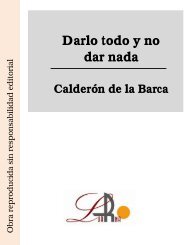Attention! Your ePaper is waiting for publication!
By publishing your document, the content will be optimally indexed by Google via AI and sorted into the right category for over 500 million ePaper readers on YUMPU.
This will ensure high visibility and many readers!

Your ePaper is now published and live on YUMPU!
You can find your publication here:
Share your interactive ePaper on all platforms and on your website with our embed function

You also want an ePaper? Increase the reach of your titles
YUMPU automatically turns print PDFs into web optimized ePapers that Google loves.
savages. In certain morbid states <strong>of</strong> the brain<br />
this tendency is exaggerated to an extraordinary<br />
degree: some hemiplegic patients and others,<br />
at the commencement <strong>of</strong> inflammatory s<strong>of</strong>tening<br />
<strong>of</strong> the brain, unconsciously imitate every<br />
word which is uttered, whether in their own or<br />
in a foreign language, and every gesture or action<br />
which is performed near them. (14. Dr.<br />
Bateman, 'On Aphasia,' 1870, p. 110.) Desor (15.<br />
Quoted by Vogt, 'Memoire sur les Microcephales,'<br />
1867, p. 168.) has remarked that no<br />
animal voluntarily imitates an action performed<br />
by man, until in the ascending scale we<br />
come to monkeys, which are well known to be<br />
ridiculous mockers. Animals, however, sometimes<br />
imitate each other's actions: thus two species<br />
<strong>of</strong> wolves, which had been reared by dogs,<br />
learned to bark, as does sometimes the jackal<br />
(16. <strong>The</strong> 'Variation <strong>of</strong> Animals and Plants under<br />
Domestication,' vol. i. p. 27.), but whether this<br />
can be called voluntary imitation is another<br />
question. Birds imitate the songs <strong>of</strong> their par-
savages. In certain morbid states <strong>of</strong> the brain this tendency is exaggerated to an extraordinary degree: some hemiplegic patients and others, at the commencement <strong>of</strong> inflammatory s<strong>of</strong>tening <strong>of</strong> the brain, unconsciously imitate every word which is uttered, whether in their own or in a foreign language, and every gesture or action which is performed near them. (14. Dr. Bateman, 'On Aphasia,' 1870, p. 110.) Desor (15. Quoted by Vogt, 'Memoire sur les Microcephales,' 1867, p. 168.) has remarked that no animal voluntarily imitates an action performed by man, until in the ascending scale we come to monkeys, which are well known to be ridiculous mockers. Animals, however, sometimes imitate each other's actions: thus two species <strong>of</strong> wolves, which had been reared by dogs, learned to bark, as does sometimes the jackal (16. <strong>The</strong> 'Variation <strong>of</strong> Animals and Plants under Domestication,' vol. i. p. 27.), but whether this can be called voluntary imitation is another question. Birds imitate the songs <strong>of</strong> their par-
ents, and sometimes <strong>of</strong> other birds; and parrots are notorious imitators <strong>of</strong> any sound which they <strong>of</strong>ten hear. Dureau de la Malle gives an account (17. 'Annales des Sciences Nat.' (1st Series), tom. xxii. p. 397.) <strong>of</strong> a dog reared by a cat, who learnt to imitate the well-known action <strong>of</strong> a cat licking her paws, and thus washing her ears and face; this was also witnessed by the celebrated naturalist Audouin. I have received several confirmatory accounts; in one <strong>of</strong> these, a dog had not been suckled by a cat, but had been brought up with one, together with kittens, and had thus acquired the above habit, which he ever afterwards practised during his life <strong>of</strong> thirteen years. Dureau de la Malle's dog likewise learnt from the kittens to play with a ball by rolling it about with his fore paws, and springing on it. A correspondent assures me that a cat in his house used to put her paws into jugs <strong>of</strong> milk having too narrow a mouth for her head. A kitten <strong>of</strong> this cat soon learned the same
- Page 1 and 2:
Work reproduced with no editorial r
- Page 3 and 4:
INTRODUCTION. The nature of the fol
- Page 5 and 6:
form, we are deprived of the weight
- Page 7 and 8:
This work contains hardly any origi
- Page 9 and 10:
probably never have completed it. A
- Page 11 and 12:
aces of man. But owing to the lengt
- Page 13 and 14:
must be classed as doubtful species
- Page 15 and 16:
ain of man has its analogy in that
- Page 17 and 18:
chemical reagent.) of their tissues
- Page 19 and 20:
prove how similar the nerves of tas
- Page 21 and 22:
idem in Cynocephalo. Illustrissimus
- Page 23 and 24:
First visceral arch. g. Second visc
- Page 25 and 26:
oth drawings removed. I was directe
- Page 27 and 28:
will conclude with a quotation from
- Page 29 and 30:
are useless, or nearly useless, and
- Page 31 and 32:
vol. ii pp. 317 and 397. See also '
- Page 33 and 34:
Some few persons have the power of
- Page 35 and 36:
attention towards them, could recov
- Page 37 and 38:
large and heavy birds, which, from
- Page 39 and 40:
and Mr. E. Ray Lankester informs me
- Page 41 and 42:
een sent me, the projection is so l
- Page 43 and 44:
e rapidly drawn across the whole ey
- Page 45 and 46:
white races. See his paper, 'Medico
- Page 47 and 48:
the body are the rudiments of the u
- Page 49 and 50:
naked, like the inferior surfaces o
- Page 51 and 52:
thropological Review, July 1867, p.
- Page 53 and 54:
pendage is a rudiment, we may infer
- Page 55 and 56:
Petersbourg,' tom. xii. 1867, p. 44
- Page 57 and 58:
pont found thirty per cent. of perf
- Page 59 and 60:
y Prof. Turner, has been expressly
- Page 61 and 62:
inheritance, that is, on parts acqu
- Page 63 and 64:
etc., is utterly inexplicable. (56.
- Page 65 and 66:
seal, bat, reptile, etc., can at fi
- Page 67 and 68:
Variability of body and mind in man
- Page 69 and 70:
much diversity in the teeth as in t
- Page 71 and 72:
The variability or diversity of the
- Page 73 and 74:
wonderfully complex combination of
- Page 75 and 76:
has never long been controlled, eit
- Page 77 and 78:
If then in outward manner, form, an
- Page 79 and 80:
continued use or disuse of parts. T
- Page 81 and 82:
Military and Anthrop. Statistics,'
- Page 83 and 84:
arrive at any precise result. Dr. B
- Page 85 and 86:
their coats. When one kidney ceases
- Page 87 and 88:
is hereditary; there is really some
- Page 89 and 90:
Variation of Animals under Domestic
- Page 91 and 92:
phere, they have acquired chests an
- Page 93 and 94:
served that they still inherited th
- Page 95 and 96:
idiots, as described in Vogt's memo
- Page 97 and 98:
Many of the cases to be here given,
- Page 99 and 100:
mammae (of course rudimentary) in t
- Page 101 and 102:
mestication why I now place little
- Page 103 and 104:
into the body of the uterus." The a
- Page 105 and 106:
Professor Canestrini, after discuss
- Page 107 and 108:
pecially, as Canestrini has observe
- Page 109 and 110:
nine character, as Owen (42. 'Anato
- Page 111 and 112:
to an ape-like progenitor. He who r
- Page 113 and 114:
Dr. Murie and Mr. St. George Mivart
- Page 115 and 116:
ing muscles in the lower animals. (
- Page 117 and 118:
muscles of the human neck, shoulder
- Page 119 and 120:
CORRELATED VARIATION. In man, as in
- Page 121 and 122:
RATE OF INCREASE. Civilised populat
- Page 123 and 124:
suckling their infants during a lon
- Page 125 and 126:
support a wife; and they generally
- Page 127 and 128:
pan) it has been intentionally enco
- Page 129 and 130:
elephant, the slowest breeder of al
- Page 131 and 132:
ther occasionally or habitually, ha
- Page 133 and 134:
smallest proficiency in it might re
- Page 135 and 136:
only have endowed the savage with a
- Page 137 and 138:
with precision, or to form a flint
- Page 139 and 140:
and, as I have myself seen, are qui
- Page 141 and 142:
sume his erect attitude, which form
- Page 143 and 144:
progression of the higher apes, to
- Page 145 and 146:
in structure more nearly to the bip
- Page 147 and 148:
teeth; but as they gradually acquir
- Page 149 and 150: tles. (78. Dujardin, 'Annales des S
- Page 151 and 152: inhabitants of Britain have "much m
- Page 153 and 154: many facts shew how easily the skul
- Page 155 and 156: was 3.15 and the latter 4.3 inches
- Page 157 and 158: ates,' vol. iii. p. 619.) than thos
- Page 159 and 160: have led to the denudation of his b
- Page 161 and 162: pologie,' 1872; 'La Constitution de
- Page 163 and 164: unneus is formed of eleven vertebra
- Page 165 and 166: epilepsy in guinea-pigs, and likewi
- Page 167 and 168: gether. Independently of correlatio
- Page 169 and 170: secondly, that natural selection ha
- Page 171 and 172: the injurious will be thus eliminat
- Page 173 and 174: Judging from the habits of savages
- Page 175 and 176: adduces the naked and unprotected s
- Page 177 and 178: from his fellow-men. No country in
- Page 179 and 180: descent from some lower form; but i
- Page 181 and 182: Differences of this kind between th
- Page 183 and 184: somewhat fewer instincts than those
- Page 185 and 186: Although the first dawnings of inte
- Page 187 and 188: a reflex action, yet it is not impr
- Page 189 and 190: his work by practice; a beaver, on
- Page 191 and 192: dotes have been published on the lo
- Page 193 and 194: maternal affection exhibited in the
- Page 195 and 196: in the old baboon. Monkeys will als
- Page 197 and 198: We will now turn to the more intell
- Page 199: frightened, they soon approached, h
- Page 203 and 204: easily approached. Mr. Bartlett has
- Page 205 and 206: The IMAGINATION is one of the highe
- Page 207 and 208: liberate, and resolve. It is a sign
- Page 209 and 210: fishes, that he was sometimes compl
- Page 211 and 212: I have seen, as I daresay have othe
- Page 213 and 214: ly as would a philosopher in his lo
- Page 215 and 216: The following cases relate to dogs.
- Page 217 and 218: writers even yet deny that the high
- Page 219 and 220: such aphorisms, but they are almost
- Page 221 and 222: have come into play. I have receive
- Page 223 and 224: Mus coninga to its superior cunning
- Page 225 and 226: were employed as implements; but th
- Page 227 and 228: implement for a special purpose is
- Page 229 and 230: It would be very difficult for any
- Page 231 and 232: never reflects on his past pleasure
- Page 233 and 234: hypothesis is a false one." (46. Th
- Page 235 and 236: movements of the muscles of the fac
- Page 237 and 238: ii. p. 309. Dr. A. Moschkau informs
- Page 239 and 240: olog., tom. x. p. 119.) has proved,
- Page 241 and 242: cal cadences, that is in singing, a
- Page 243 and 244: early progenitor of man must have b
- Page 245 and 246: partly on the disposition of the mi
- Page 247 and 248: certain sounds with certain general
- Page 249 and 250: larly constructed, these being used
- Page 251 and 252:
often remain as the rudiments of an
- Page 253 and 254:
the Lapponian, and many of the Amer
- Page 255 and 256:
SENSE OF BEAUTY. This sense has bee
- Page 257 and 258:
irregular intervals are highly disa
- Page 259 and 260:
most remarkable and typical differe
- Page 261 and 262:
As Mr. M'Lennan (75. 'The Worship o
- Page 263 and 264:
dowed with some form of life, and w
- Page 265 and 266:
eligious rites; and Jemmy Button, w
- Page 267 and 268:
lood-loving god; the trial of innoc
- Page 269 and 270:
sense or conscience is by far the m
- Page 271 and 272:
man is a social animal ('Psychologi
- Page 273 and 274:
these feelings and services are by
- Page 275 and 276:
would acquire exactly the same mora
- Page 277 and 278:
tain stronger or more enduring inst
- Page 279 and 280:
first discovers an enemy, warns the
- Page 281 and 282:
drive away a third stallion from a
- Page 283 and 284:
they actually sympathise in the pai
- Page 285 and 286:
his companions. Mr. Blyth, as he in
- Page 287 and 288:
to escape, after, as the surgeon th
- Page 289 and 290:
teach him silence and obedience. Mr
- Page 291 and 292:
than a thousand miles, could have f
- Page 293 and 294:
duals which took the greatest pleas
- Page 295 and 296:
Bain's Mental and Moral Science,' 1
- Page 297 and 298:
It is, however, impossible to decid
- Page 299 and 300:
east against the wires of her cage,
- Page 301 and 302:
of the year during the whole day, m
- Page 303 and 304:
same manner as with the lower anima
- Page 305 and 306:
judgment of his fellow-men, and unf
- Page 307 and 308:
y the same instinctive motive, whic
- Page 309 and 310:
their comrades; and surely their co
- Page 311 and 312:
actions, yet it is untenable, that
- Page 313 and 314:
felt except in the presence of dang
- Page 315 and 316:
pressions of past hunger, vengeance
- Page 317 and 318:
will surely come. He will then feel
- Page 319 and 320:
een stirred to the bottom of his so
- Page 321 and 322:
hesitation." (29. E.B. Tylor, in 'C
- Page 323 and 324:
he has no such sympathy, and if his
- Page 325 and 326:
tant. But they are practised almost
- Page 327 and 328:
that an Indian Thug conscientiously
- Page 329 and 330:
to your enemy has rarely been thoug
- Page 331 and 332:
unmarried females. How slowly it sp
- Page 333 and 334:
I have entered into the above detai
- Page 335 and 336:
the two do not easily co-exist in t
- Page 337 and 338:
and to take as the standard of mora
- Page 339 and 340:
influence in the burning sense of s
- Page 341 and 342:
supported as they are by reason, sh
- Page 343 and 344:
spreads through instruction and exa
- Page 345 and 346:
are likewise transmitted. That the
- Page 347 and 348:
some feeling of sympathy, and have
- Page 349 and 350:
to the feelings caused by other pow
- Page 351 and 352:
sounds had never crossed their mind
- Page 353 and 354:
Marcus Aurelius,' etc., p. 139.)—
- Page 355 and 356:
difications through natural selecti
- Page 357 and 358:
er of offspring. The tribes, which
- Page 359 and 360:
tedly it would be interesting to tr
- Page 361 and 362:
ed was found to be valuable, the de
- Page 363 and 364:
course of time it would, judging fr
- Page 365 and 366:
nevolent actions. Habits, moreover,
- Page 367 and 368:
We may therefore conclude that prim
- Page 369 and 370:
morality will certainly give an imm
- Page 371 and 372:
Fuego, it struck me that the posses
- Page 373 and 374:
a vigorous state of health. We civi
- Page 375 and 376:
In every country in which a large s
- Page 377 and 378:
doubt wealth when very great tends
- Page 379 and 380:
ges. (13. Quatrefages, 'Revue des C
- Page 381 and 382:
higher degree by their works than b
- Page 383 and 384:
men rarely marry; both suffer from
- Page 385 and 386:
in comfort. Those who marry early p
- Page 387 and 388:
towns than in rural districts, "and
- Page 389 and 390:
Report of Births, Deaths, etc., in
- Page 391 and 392:
moral qualities. (25. Dr. Duncan re
- Page 393 and 394:
mind and body. But development of a
- Page 395 and 396:
them. In Spain alone some of the be
- Page 397 and 398:
Natural selection follows from the
- Page 399 and 400:
causes of progress seem to consist
- Page 401 and 402:
Botocudos, who inhabit the finest p
- Page 403 and 404:
Testament.") and not admit that alm
- Page 405 and 406:
eady become somewhat advanced. Look
- Page 407 and 408:
Even if it be granted that the diff
- Page 409 and 410:
kingdom. (1. Isidore Geoffroy St.-H
- Page 411 and 412:
slaves. They move the eggs of their
- Page 413 and 414:
vol. ii. 1840, p. 87.) Classificati
- Page 415 and 416:
We can further see why a great amou
- Page 417 and 418:
apparently follow from their differ
- Page 419 and 420:
as well as by various drugs, and ot
- Page 421 and 422:
Richtung der Haare,' etc., Muller's
- Page 423 and 424:
It would, however, be rash to trust
- Page 425 and 426:
Although, as we have now seen, man
- Page 427 and 428:
tion of the Simiadae. This family i
- Page 429 and 430:
the brain, does not admit the exist
- Page 431 and 432:
and Platyrrhine monkeys, with their
- Page 433 and 434:
1868, s. 61. Also his 'Naturliche S
- Page 435 and 436:
We are far from knowing how long ag
- Page 437 and 438:
hous apes, as Professor Schaaffhaus
- Page 439 and 440:
Most of the remnants survive on isl
- Page 441 and 442:
eason to believe, that no true bird
- Page 443 and 444:
evidently a widely-diffused remnant
- Page 445 and 446:
the satisfaction of seeing, in Apri
- Page 447 and 448:
then be justified in believing that
- Page 449 and 450:
period the uterus was double; the e
- Page 451 and 452:
counter a singular difficulty. In t
- Page 453 and 454:
The possession by male mammals of f
- Page 455 and 456:
and in the case of the Marsupials,
- Page 457 and 458:
sionally to become so well develope
- Page 459 and 460:
great kingdom of the Vertebrata it
- Page 461 and 462:
in two weeks; those of the fowl in
- Page 463 and 464:
quality. The world, it has often be
- Page 465 and 466:
alists are practically guided by th
- Page 467 and 468:
etween the races, we must make some
- Page 469 and 470:
tions of the brain. (3. See, for in
- Page 471 and 472:
tian caves of Abou-Simbel, M. Pouch
- Page 473 and 474:
low temperature, or any considerabl
- Page 475 and 476:
is, whether any of them are descend
- Page 477 and 478:
e whether the races of men, when cr
- Page 479 and 480:
and mulattoes, have a maxim that mu
- Page 481 and 482:
laws, for instance, that of the une
- Page 483 and 484:
e produced at the rarest intervals.
- Page 485 and 486:
completely black or completely whit
- Page 487 and 488:
dians, and Europeans; and judging f
- Page 489 and 490:
But the most weighty of all the arg
- Page 491 and 492:
those forms which at present appear
- Page 493 and 494:
The question whether mankind consis
- Page 495 and 496:
her all the domestic races of the d
- Page 497 and 498:
ner with the improved breeds of cat
- Page 499 and 500:
plainly retained, in certain bones
- Page 501 and 502:
gesture-language, by the same expre
- Page 503 and 504:
The same argument may be applied wi
- Page 505 and 506:
in any extreme degree to those poss
- Page 507 and 508:
With our domestic animals a new rac
- Page 509 and 510:
speak a word of the language of a l
- Page 511 and 512:
down the numbers of each savage tri
- Page 513 and 514:
extinction, believed that changed h
- Page 515 and 516:
who were in 1832 transported to Fli
- Page 517 and 518:
Similar facts have been observed in
- Page 519 and 520:
unproductiveness of the women, and
- Page 521 and 522:
ious places, in order to be educate
- Page 523 and 524:
ding to Dr. Ruschenberger of the U.
- Page 525 and 526:
the natives, and they soon became "
- Page 527 and 528:
tants of the Valley of Nepal, which
- Page 529 and 530:
aborigines of islands have suffered
- Page 531 and 532:
many years together in their own co
- Page 533 and 534:
We can see why it is that aborigine
- Page 535 and 536:
y the House of Commons, May 29, 186
- Page 537 and 538:
certain the precise causes and thei
- Page 539 and 540:
But as with our domesticated animal
- Page 541 and 542:
posed to be more influential in mod
- Page 543 and 544:
negro seems to be partly inherent,
- Page 545 and 546:
improbable. Consequently I endeavou
- Page 547 and 548:
late Dr. Daniell, who had long live
- Page 549 and 550:
ed by a medical man, that some year
- Page 551 and 552:
cording to the position of the vall
- Page 553 and 554:
the Fuegians on board the "Beagle"
- Page 555 and 556:
e of the Mandans, about one in ten
- Page 557 and 558:
morphic, which have remained extrem
- Page 559 and 560:
NOTE ON THE RESEMBLANCES AND DIFFER
- Page 561 and 562:
B. x. 1868.) on the cerebral convol
- Page 563 and 564:
ule, in man, the temporo-occipital
- Page 565 and 566:
paper on this subject the latter wr
- Page 567 and 568:
1862.); and more or less obliterate
- Page 569 and 570:
In the paper to which I have referr
- Page 571 and 572:
This statement was a strictly accur
- Page 573 and 574:
mitting the similarity between the
- Page 575 and 576:
giques de Gratiolet' ('Mem. de la S
- Page 577 and 578:
made the subject of renewed investi
- Page 579 and 580:
pal sulci of the frontal, parietal,
- Page 581 and 582:
with no sulci but the sylvian and t
- Page 583 and 584:
excellent author of one of the most
- Page 585 and 586:
several forms of inheritance—Caus
- Page 587 and 588:
here concern us. There are, however
- Page 589 and 590:
are generally confined to the lower
- Page 591 and 592:
find the female, he requires organs
- Page 593 and 594:
locomotive organs more highly devel
- Page 595 and 596:
vocal or instrumental music—and t
- Page 597 and 598:
state of nature, have by a long sel
- Page 599 and 600:
Mr. Swaysland of Brighton has been
- Page 601 and 602:
young—a period which must be dete
- Page 603 and 604:
former, there can be little doubt,
- Page 605 and 606:
so simple and short an affair as mi
- Page 607 and 608:
NUMERICAL PROPORTION OF THE TWO SEX
- Page 609 and 610:
ment of doubt; for it is a well-asc
- Page 611 and 612:
to lead to effective sexual selecti
- Page 613 and 614:
We will first briefly run through t
- Page 615 and 616:
is polygamous, but, except in his g
- Page 617 and 618:
far as I can learn, the sexes rarel
- Page 619 and 620:
differences, are polygamous, but Mr
- Page 621 and 622:
irds, whether the male tragopan (on
- Page 623 and 624:
females, which must pair with the l
- Page 625 and 626:
apparently of Batrachians. Througho
- Page 627 and 628:
paratively passive, generally exert
- Page 629 and 630:
should retain the same habit; and t
- Page 631 and 632:
dings of the Royal Society,' vol. x
- Page 633 and 634:
very many instances widely differen
- Page 635 and 636:
tion. Nevertheless, they may become
- Page 637 and 638:
males, and the latter the more attr
- Page 639 and 640:
al selection for the sake of protec
- Page 641 and 642:
certain stags—has been carried to
- Page 643 and 644:
hackles, comb, spurs, voice, and ev
- Page 645 and 646:
developed atoms, which are transmit
- Page 647 and 648:
feather is transversely marked by n
- Page 649 and 650:
change the colour of the coat durin
- Page 651 and 652:
in the English Carrier pigeon, and
- Page 653 and 654:
There is one difficult question whi
- Page 655 and 656:
markable how very closely he sugges
- Page 657 and 658:
fer much in constitution before the
- Page 659 and 660:
acters of the adults must have been
- Page 661 and 662:
the roebuck, to ten, twelve or even
- Page 663 and 664:
horns of the female: see also his p
- Page 665 and 666:
veloped later in life in this breed
- Page 667 and 668:
in the common peacock; but M. Hegt
- Page 669 and 670:
which the characters follow our two
- Page 671 and 672:
pear late in life in one sex are tr
- Page 673 and 674:
the class previously alluded to, in
- Page 675 and 676:
laced plumage of the Sebright banta
- Page 677 and 678:
the reindeer, in which both sexes b
- Page 679 and 680:
either or both sexes have been affe
- Page 681 and 682:
y acquiring structures, such as gre
- Page 683 and 684:
have not frequently been accumulate
- Page 685 and 686:
As no one, as far as I can discover
- Page 687 and 688:
the female births have exceeded the
- Page 689 and 690:
ce to show that, at almost every st
- Page 691 and 692:
It seems at first sight a mysteriou
- Page 693 and 694:
important though not the sole facto
- Page 695 and 696:
failed to produce offspring. During
- Page 697 and 698:
lieve that females are produced in
- Page 699 and 700:
as well as some of the following re
- Page 701 and 702:
females: the natives believe that t
- Page 703 and 704:
Sweden,' 1867, pp. 12, 132.), that
- Page 705 and 706:
one. It should, however, be borne i
- Page 707 and 708:
Infertile females might readily be
- Page 709 and 710:
than flight." He then adds, that by
- Page 711 and 712:
nion appears to be that the sexes a
- Page 713 and 714:
in number; but three South African
- Page 715 and 716:
ed from the eggs and caterpillars a
- Page 717 and 718:
maturity, when the sexes are ready
- Page 719 and 720:
or varieties of moths (Heterocera)
- Page 721 and 722:
number, whatever the proportions ma
- Page 723 and 724:
les, and "two or three are often fo
- Page 725 and 726:
exceeded the females in number; in
- Page 727 and 728:
and thus we see how ignorant we are
- Page 729 and 730:
males; but he suggests that this pr
- Page 731 and 732:
nious manner. "Let us for the purpo
- Page 733 and 734:
monstratively fixed, it is quite cl
- Page 735 and 736:
servations apply to the whole archi
- Page 737 and 738:
and kept from the use of spirits. H
- Page 739 and 740:
From the several foregoing cases we
- Page 741 and 742:
oons, it is conceivable that a male
- Page 743 and 744:
acquired before maturity—Spiders,
- Page 745 and 746:
condition of others, and the low me
- Page 747 and 748:
devourers that they are distasteful
- Page 749 and 750:
the Molluscoida of some authors), f
- Page 751 and 752:
strong and healthy individual disap
- Page 753 and 754:
influential to a certain extent; fo
- Page 755 and 756:
organised creatures this is extreme
- Page 757 and 758:
ting a partner, or for the individu
- Page 759 and 760:
the number of the smelling-threads,
- Page 761 and 762:
chelae of the male. N.B.—The arti
- Page 763 and 764:
cording to a statement quoted by Mi
- Page 765 and 766:
certainly suffice to hold the femal
- Page 767 and 768:
fe. This fact shews that in the Amp
- Page 769 and 770:
sexes of the higher animals so ofte
- Page 771 and 772:
the larger size of their chelae. In
- Page 773 and 774:
ordinary coloration of the genus to
- Page 775 and 776:
each other in the size and length o
- Page 777 and 778:
and too small for her to catch with
- Page 779 and 780:
legs belonging either to one of the
- Page 781 and 782:
213.) The ocelli are absent in the
- Page 783 and 784:
hed, so that he is thus enabled to
- Page 785 and 786:
the male of Crabro cribrarius (Fig.
- Page 787 and 788:
ation (10. E. Doubleday, 'Annals an
- Page 789 and 790:
mals, we can understand why she has
- Page 791 and 792:
create a large number of offspring
- Page 793 and 794:
ger than the females. The explanati
- Page 795 and 796:
quite black, and the females obscur
- Page 797 and 798:
33) that, "the captured flies utter
- Page 799 and 800:
ORDER: HOMOPTERA. Every one who has
- Page 801 and 802:
temdecim,' by Dr. Hartman.), "the d
- Page 803 and 804:
unmusical even to the human ear, so
- Page 805 and 806:
d'Anat. Comp.' (French translat.),
- Page 807 and 808:
Coleoptera. But Dr. Gruber further
- Page 809 and 810:
wing-cover, which underlies the oth
- Page 811 and 812:
In the last and third family, namel
- Page 813 and 814:
Cape of Good Hope these insects mak
- Page 815 and 816:
yed by the Homoptera. (43. Landois
- Page 817 and 818:
p. 427; for crickets, p. 445.) With
- Page 819 and 820:
with splendid green, blue, yellow,
- Page 821 and 822:
sub-families, the males on first em
- Page 823 and 824:
mes two chasing one female, and con
- Page 825 and 826:
In this Order slight differences in
- Page 827 and 828:
for the possession of the females;
- Page 829 and 830:
worker-bees is a much more difficul
- Page 831 and 832:
some degree probable in those group
- Page 833 and 834:
one species both are of a beautiful
- Page 835 and 836:
genus Onthophagus, there are specie
- Page 837 and 838:
espect amongst well-developed indiv
- Page 839 and 840:
projection in the same situation. S
- Page 841 and 842:
species of Bledius (Fig. 23), also
- Page 843 and 844:
187.) enclosed two males with one f
- Page 845 and 846:
provided or degenerate males. Altho
- Page 847 and 848:
tance of several feet or even yards
- Page 849 and 850:
indebted to Mr. E.W. Janson, for in
- Page 851 and 852:
[Fig.26. Hind-leg of Geotrupes ster
- Page 853 and 854:
that from the noise thus produced b
- Page 855 and 856:
me number of females; in order, the
- Page 857 and 858:
ut the chief difference is that the
- Page 859 and 860:
devour a large beetle, would be fri
- Page 861 and 862:
illiant in the males—Examples—N
- Page 863 and 864:
The Ageronia feronia makes a noise
- Page 865 and 866:
Every one must have admired the ext
- Page 867 and 868:
don,' 1869, p. 278.) In nine of the
- Page 869 and 870:
sexes. In a few species, for instan
- Page 871 and 872:
the species belongs. Hence in most
- Page 873 and 874:
follow exactly the same habits of l
- Page 875 and 876:
in which the sexes differ greatly i
- Page 877 and 878:
As Mr. Walsh has remarked to me, th
- Page 879 and 880:
mies; nevertheless, as the hind-win
- Page 881 and 882:
The bright colours of many butterfl
- Page 883 and 884:
than the lower. Hence the lower sur
- Page 885 and 886:
"holding their wings quite erect ov
- Page 887 and 888:
fully explained. The white female o
- Page 889 and 890:
We know that ants and certain Lamel
- Page 891 and 892:
other band, the females habitually,
- Page 893 and 894:
I have as yet only referred to the
- Page 895 and 896:
it is the females which "are orname
- Page 897 and 898:
least gaudy. The male of Papilio se
- Page 899 and 900:
sexes, though arising and perfected
- Page 901 and 902:
elieves that the difference between
- Page 903 and 904:
they would tend to counteract each
- Page 905 and 906:
orange wing-tips of the male; conse
- Page 907 and 908:
Soc.' vol. xxiii. 1862, p. 495.), w
- Page 909 and 910:
valuable, as Mr. Riley here discuss
- Page 911 and 912:
mitted to, and developed in, the ma
- Page 913 and 914:
length, transversely banded with bl
- Page 915 and 916:
p. lxxx.) it was supported by vario
- Page 917 and 918:
SUMMARY AND CONCLUDING RE- MARKS ON
- Page 919 and 920:
make the loudest or most continuous
- Page 921 and 922:
tected species inhabiting the same
- Page 923 and 924:
the more ornamented, and departs mo
- Page 925 and 926:
the Coleoptera, however, as before
- Page 927 and 928:
ed, in all these respects between b
- Page 929 and 930:
upper outer surface of their pector
- Page 931 and 932:
her hiding-place and surveys the ne
- Page 933 and 934:
and many so injure each other as to
- Page 935 and 936:
projection, and the teeth grow into
- Page 937 and 938:
tish Fishes,' vol. ii. 1836, p. 416
- Page 939 and 940:
cal fishes differ sexually in colou
- Page 941 and 942:
ightest, to conceive the admixture
- Page 943 and 944:
In a siluroid fish, inhabiting the
- Page 945 and 946:
ny of the Chromidae, for instance i
- Page 947 and 948:
and iridescent. (24. 'The American
- Page 949 and 950:
myriad ova with which they are lade
- Page 951 and 952:
To return to our more immediate sub
- Page 953 and 954:
animals, splendid colours may be th
- Page 955 and 956:
they were thus rendered highly cons
- Page 957 and 958:
tain fishes, moreover, can through
- Page 959 and 960:
Certain fishes, belonging to severa
- Page 961 and 962:
the spawning-season than at any oth
- Page 963 and 964:
ather brighter than the females. Th
- Page 965 and 966:
the same sex, and accumulated throu
- Page 967 and 968:
May 1870, p. 40.) From this stateme
- Page 969 and 970:
ted, though lurid tints, and these
- Page 971 and 972:
that as soon as he saw its happy se
- Page 973 and 974:
to sit in the evening to listen to
- Page 975 and 976:
than the females: during the pairin
- Page 977 and 978:
snakes of N. America, the male of w
- Page 979 and 980:
They are not known to fight togethe
- Page 981 and 982:
of the first coral- snake which I s
- Page 983 and 984:
that the rattle may not be of use t
- Page 985 and 986:
[Fig.33. Sitana minor. Male with th
- Page 987 and 988:
likewise have a low crest running a
- Page 989 and 990:
Fig. 36. Chamaeleo Owenii. Upper fi
- Page 991 and 992:
labris there is a still greater dif
- Page 993 and 994:
played almost as important a part w
- Page 995 and 996:
during the summer months is confine
- Page 997 and 998:
y Mr. J. Jenner Weir that the bird-
- Page 999 and 1000:
'Natural History of Ireland: Birds,
- Page 1001 and 1002:
ta); and where these fights have oc
- Page 1003 and 1004:
namely spurs, which can be used wit
- Page 1005 and 1006:
have fought; and the black-cocks "m
- Page 1007 and 1008:
has been seen with five spurs. The
- Page 1009 and 1010:
s. 740. See also on this bird Azara
- Page 1011 and 1012:
ious other birds, they are generall
- Page 1013 and 1014:
me more brilliant during the breedi
- Page 1015 and 1016:
sing noise made by some nestling-bi
- Page 1017 and 1018:
irds during his whole life, asserts
- Page 1019 and 1020:
is clear, for a sterile, hybrid can
- Page 1021 and 1022:
has also been argued, that the song
- Page 1023 and 1024:
'Todd's Cyclopaedia of Anatomy and
- Page 1025 and 1026:
In some birds the vocal organs diff
- Page 1027 and 1028:
hold water, but is connected with t
- Page 1029 and 1030:
is furnished with an additional pai
- Page 1031 and 1032:
lack-cock certainly serves as a cal
- Page 1033 and 1034:
directly to the place where the mal
- Page 1035 and 1036:
Grouse, Richardson, 'Fauna Bor. Ame
- Page 1037 and 1038:
webs being strongly bound together.
- Page 1039 and 1040:
known to make a humming noise whils
- Page 1041 and 1042:
Sclater, in 'Proceedings, Zoologica
- Page 1043 and 1044:
the raw meat and reeking liver take
- Page 1045 and 1046:
y summons," and when they approach
- Page 1047 and 1048:
tain Stokes has described the habit
- Page 1049 and 1050:
they often swell and assume vivid t
- Page 1051 and 1052:
sexual selection of these ornamenta
- Page 1053 and 1054:
hers of this kind occur in the tail
- Page 1055 and 1056:
consequently tending to vary in the
- Page 1057 and 1058:
ald, "and of a rich cobalt blue, cr
- Page 1059 and 1060:
very rare colour in terrestrial spe
- Page 1061 and 1062:
ing this period on the head of the
- Page 1063 and 1064:
Fourthly, there are birds the sexes
- Page 1065 and 1066:
fluence on any other characters; an
- Page 1067 and 1068:
(81. On the moulting of the ptarmig
- Page 1069 and 1070:
undergo a double moult, keep their
- Page 1071 and 1072:
with some proper to the female; and
- Page 1073 and 1074:
cal Biography,' vol. i. pp. 174, 22
- Page 1075 and 1076:
trains, and strutting about in all
- Page 1077 and 1078:
finement in the Malay Archipelago,
- Page 1079 and 1080:
attitude the ocelli over the whole
- Page 1081 and 1082:
The ocelli on the wing-feathers are
- Page 1083 and 1084:
dary feathers, when they are all ex
- Page 1085 and 1086:
also, finds that all male birds wit
- Page 1087 and 1088:
once than otherwise would be the ca
- Page 1089 and 1090:
Gould's 'Handbook to the Birds of A
- Page 1091 and 1092:
when we see a peacock strutting abo
- Page 1093 and 1094:
'Nat. Hist. Lib.: Birds,' vol. xiv.
- Page 1095 and 1096:
CHAPTER XIV. BIRDS—continued. Cho
- Page 1097 and 1098:
LENGTH OF COURTSHIP. The lengthened
- Page 1099 and 1100:
they may be seen running about "lik
- Page 1101 and 1102:
owers of the Bower- birds are the r
- Page 1103 and 1104:
suspect, improbable as this will at
- Page 1105 and 1106:
it probable that most of them were
- Page 1107 and 1108:
mate, and so for several times foll
- Page 1109 and 1110:
irds, are always seen during the sp
- Page 1111 and 1112:
the authority of the Hon. and Rev.
- Page 1113 and 1114:
sion. (9. I am indebted to Prof. Ne
- Page 1115 and 1116:
homes after an interval of nine mon
- Page 1117 and 1118:
as is proved by the strong and perm
- Page 1119 and 1120:
lack- headed. This bullfinch was a
- Page 1121 and 1122:
Mr. Gould states that certain hummi
- Page 1123 and 1124:
vered;" and the taste, as we see, o
- Page 1125 and 1126:
230. Mr. J. Jenner Weir has lately
- Page 1127 and 1128:
dishments, for they nested and prod
- Page 1129 and 1130:
United States and observing the bir
- Page 1131 and 1132:
Turning now to domesticated and con
- Page 1133 and 1134:
There is reason to believe that pig
- Page 1135 and 1136:
(23. Boitard and Corbie, 'Les Pigeo
- Page 1137 and 1138:
y Mr. Sclater as a distinct species
- Page 1139 and 1140:
Female birds not only exert a choic
- Page 1141 and 1142:
prefers the younger to the older he
- Page 1143 and 1144:
ornaments the males with rare excep
- Page 1145 and 1146:
differ fundamentally from ours. Fro
- Page 1147 and 1148:
can forms which until lately were n
- Page 1149 and 1150:
sexes, or a greater effect on one s
- Page 1151 and 1152:
does not appear that intermediate g
- Page 1153 and 1154:
Macgillivray, 'History of British B
- Page 1155 and 1156:
to vary, both with animals in a sta
- Page 1157 and 1158:
eyes have been preserved or augment
- Page 1159 and 1160:
eeds of the fowl. In all the breeds
- Page 1161 and 1162:
cases we have feathers symmetricall
- Page 1163 and 1164:
eptiles and fishes, on the skin of
- Page 1165 and 1166:
engraved from a beautiful drawing,
- Page 1167 and 1168:
differently coloured fowls, and the
- Page 1169 and 1170:
lue, indented centre, surrounded by
- Page 1171 and 1172:
y Mr. Bartlett that they resemble t
- Page 1173 and 1174:
fered fundamentally from those of t
- Page 1175 and 1176:
satisfaction, this appeared to be s
- Page 1177 and 1178:
cock. Many female progenitors of th
- Page 1179 and 1180:
Fig.59. Portion of one of the secon
- Page 1181 and 1182:
shades off downwards into a pale-le
- Page 1183 and 1184:
and might easily be overlooked. The
- Page 1185 and 1186:
the lower side with a fulvous tint.
- Page 1187 and 1188:
tic ornament (b, Fig. 59). The uppe
- Page 1189 and 1190:
parts of the ball can be perceived,
- Page 1191 and 1192:
to account for the imperfect condit
- Page 1193 and 1194:
dified through natural selection fo
- Page 1195 and 1196:
ied on until the wonderful ball-and
- Page 1197 and 1198:
feathers of humming-birds differ, w
- Page 1199 and 1200:
space than all the rest of the bird
- Page 1201 and 1202:
the conspicuous black colour of the
- Page 1203 and 1204:
do would be to persevere in selecti
- Page 1205 and 1206:
sed with the male common pheasant,
- Page 1207 and 1208:
striae. So again Mr. Tegetmeier has
- Page 1209 and 1210:
The same process would have to be f
- Page 1211 and 1212:
form of transmission into the other
- Page 1213 and 1214:
mind the reader that if sexually-li
- Page 1215 and 1216:
courtship, the males alone would ac
- Page 1217 and 1218:
gued that the females had aborigina
- Page 1219 and 1220:
from inheriting them, on account of
- Page 1221 and 1222:
tails of considerable length. The f
- Page 1223 and 1224:
having been from the first transmit
- Page 1225 and 1226:
contrast of colour between the sexe
- Page 1227 and 1228:
themselves; that those of the secon
- Page 1229 and 1230:
injured, than during cool, cloudy,
- Page 1231 and 1232:
of the above forty birds the female
- Page 1233 and 1234:
in equally well-concealed spots, bu
- Page 1235 and 1236:
the natural selection of so-called
- Page 1237 and 1238:
occasionally in a considerable degr
- Page 1239 and 1240:
that here the tail differs in colou
- Page 1241 and 1242:
strengthened by what Malherbe state
- Page 1243 and 1244:
etween the sexes of the same specie
- Page 1245 and 1246:
group will not surprise any one who
- Page 1247 and 1248:
cases. In like manner the same form
- Page 1249 and 1250:
feathers; and does not completely a
- Page 1251 and 1252:
given by Mr. R. Sharpe, 'Proceeding
- Page 1253 and 1254:
or the males alone, become extremel
- Page 1255 and 1256:
of the equal transmission of charac
- Page 1257 and 1258:
can be maintained with confidence,
- Page 1259 and 1260:
(Emberiza) resemble one another, an
- Page 1261 and 1262:
immature plumage approximately shew
- Page 1263 and 1264:
I. When the adult male is more beau
- Page 1265 and 1266:
it will suffice to call to mind the
- Page 1267 and 1268:
ear-tufts, but the female is remark
- Page 1269 and 1270:
y some remarkable facts recorded by
- Page 1271 and 1272:
winter and summer, nearly the same
- Page 1273 and 1274:
tions to which they will almost alw
- Page 1275 and 1276:
white, whilst the female P. apoda i
- Page 1277 and 1278:
with the peacock, pheasant, and fow
- Page 1279 and 1280:
former period. But since this perio
- Page 1281 and 1282:
tion, before given, is possible; na
- Page 1283 and 1284:
protection; and it is possible that
- Page 1285 and 1286:
ptarmigans, whilst changing from th
- Page 1287 and 1288:
discover, of species with the femal
- Page 1289 and 1290:
WHEN THE ADULT FEMALE IS MORE CONSP
- Page 1291 and 1292:
the males are often kept by the nat
- Page 1293 and 1294:
widely different in closely-allied
- Page 1295 and 1296:
comparison is somewhat difficult to
- Page 1297 and 1298:
llent account of the habits of this
- Page 1299 and 1300:
teris and night-jar (Eurostopodus),
- Page 1301 and 1302:
exposed to danger whilst sitting on
- Page 1303 and 1304:
WHEN THE ADULT MALE RESEMBLES THE A
- Page 1305 and 1306:
WHEN THE ADULT MALE RESEMBLES THE A
- Page 1307 and 1308:
tection; so that they have probably
- Page 1309 and 1310:
and all ages. But these characters
- Page 1311 and 1312:
and the young of the sparrow of Pal
- Page 1313 and 1314:
e distinguished from the female whe
- Page 1315 and 1316:
placed by coloured ones. (36. Mr. B
- Page 1317 and 1318:
les. But we have no reason to suppo
- Page 1319 and 1320:
chives Neerlandaises,' tom. vi. 187
- Page 1321 and 1322:
of N. America, Fringilla tristis, L
- Page 1323 and 1324:
egard to the young differing greatl
- Page 1325 and 1326:
CLASS VI. THE YOUNG IN THEIR FIRST
- Page 1327 and 1328:
in the present class is that the ma
- Page 1329 and 1330:
In considering this last case, if a
- Page 1331 and 1332:
have occurred at different periods
- Page 1333 and 1334:
confined to the females, have been
- Page 1335 and 1336:
statement is too strong.) Calling t
- Page 1337 and 1338:
they would have been much more cons
- Page 1339 and 1340:
cailzie, blackcock, black scoter-du
- Page 1341 and 1342:
Belt believes ('The Naturalist in N
- Page 1343 and 1344:
tial character, for it is developed
- Page 1345 and 1346:
when it discovers and flies down to
- Page 1347 and 1348:
ted tail-feathers or elongated cres
- Page 1349 and 1350:
progenitors of these two species, w
- Page 1351 and 1352:
not endure for ever, as we may infe
- Page 1353 and 1354:
fied means for producing various so
- Page 1355 and 1356:
differ, the males differ much more
- Page 1357 and 1358:
ornament, for producing various sou
- Page 1359 and 1360:
loured, by the selection of success
- Page 1361 and 1362:
iod of reproduction arrives; conseq
- Page 1363 and 1364:
for having looked over these four c
- Page 1365 and 1366:
ved the same fact with the hides of
- Page 1367 and 1368:
dants, degenerated in size but not
- Page 1369 and 1370:
jaw, or in both, are much larger in
- Page 1371 and 1372:
secretion from the gland is not poi
- Page 1373 and 1374:
thinner, and less branched than in
- Page 1375 and 1376:
log. Generale,' 1841, p. 513. Other
- Page 1377 and 1378:
the horns of the female Ant. euchor
- Page 1379 and 1380:
fixed character in the females than
- Page 1381 and 1382:
well as the possession of horns by
- Page 1383 and 1384:
peculiar shape as in the female, bu
- Page 1385 and 1386:
ce of tusks in some female walruses
- Page 1387 and 1388:
"make a cut down and a jerk up, wit
- Page 1389 and 1390:
[Fig. 63. Oryx leucoryx, male (from
- Page 1391 and 1392:
a little backwards, he would be com
- Page 1393 and 1394:
comes to the conclusion that their
- Page 1395 and 1396:
[Fig. 64. Strepsiceros Kudu (from S
- Page 1397 and 1398:
forward from the brow, and terminat
- Page 1399 and 1400:
Male quadrupeds, which are furnishe
- Page 1401 and 1402:
horns, and they rarely have canine
- Page 1403 and 1404:
Tennent, 'Ceylon,' 1859, vol. ii. p
- Page 1405 and 1406:
With mammals, when, as is often the
- Page 1407 and 1408:
variations in strength, size, and c
- Page 1409 and 1410:
half ounces, and at the age of six
- Page 1411 and 1412:
Scotch deer-hound may probably be a
- Page 1413 and 1414:
pons, like those of the European bo
- Page 1415 and 1416:
certain extent used for this purpos
- Page 1417 and 1418:
to which he is liable; for the male
- Page 1419 and 1420:
Judge Caton that he had never obser
- Page 1421 and 1422:
generally, or at least often, exert
- Page 1423 and 1424:
of harems is nearly full. Then the
- Page 1425 and 1426:
ted by Alex. Walker, 'On Intermarri
- Page 1427 and 1428:
preference for each other. Finally,
- Page 1429 and 1430:
strong individual antipathies and p
- Page 1431 and 1432:
dies (2. Ibid. p. 595.)) of stags p
- Page 1433 and 1434:
habits of other male quadrupeds. Th
- Page 1435 and 1436:
History of Mamm. Animals,' 1841, p.
- Page 1437 and 1438:
females. In another allied kind of
- Page 1439 and 1440:
the castoreum of the beaver, see Mr
- Page 1441 and 1442:
These glands secrete a semi-fluid f
- Page 1443 and 1444:
sing the voice of the stag, we may
- Page 1445 and 1446:
of the above-named antelopes, the P
- Page 1447 and 1448:
neck, which is much less developed
- Page 1449 and 1450:
that any character, even with anima
- Page 1451 and 1452:
I will first give briefly all the c
- Page 1453 and 1454:
Gray states, "that the males are or
- Page 1455 and 1456:
With Ruminants sexual differences o
- Page 1457 and 1458:
In the Indian black-buck (A. bezoar
- Page 1459 and 1460:
ker than in the female; but during
- Page 1461 and 1462:
nus; the young of the former, and I
- Page 1463 and 1464:
male not only by his immense mane,
- Page 1465 and 1466:
and differs from the young of both
- Page 1467 and 1468:
ted in their transmission. Neverthe
- Page 1469 and 1470:
In an earlier chapter we have seen
- Page 1471 and 1472:
emasculated at an early period, los
- Page 1473 and 1474:
esemblance. The hare on her form is
- Page 1475 and 1476:
ed cats in his house. Such cats, as
- Page 1477 and 1478:
curiously-ornamented Tragelaphus sc
- Page 1479 and 1480:
guished by colour, even by the deal
- Page 1481 and 1482:
the female), to species in which ne
- Page 1483 and 1484:
form linking together two groups, f
- Page 1485 and 1486:
stripes on the shoulders and even o
- Page 1487 and 1488:
Before we conclude, it will be well
- Page 1489 and 1490:
cheek. The appearance of Cercocebus
- Page 1491 and 1492:
pearance and bright colours. The Se
- Page 1493 and 1494:
y of Mammalia,' 1841, p. 460; see a
- Page 1495 and 1496:
cases to be merely ornamental, thou
- Page 1497 and 1498:
The law of the equal transmission o
- Page 1499 and 1500:
mana, but not so great as in some,
- Page 1501 and 1502:
character. She comes to maturity at
- Page 1503 and 1504:
tions have been made in other parts
- Page 1505 and 1506:
etween man and the Quadrumana, for
- Page 1507 and 1508:
instance with the Aymaras and Quich
- Page 1509 and 1510:
arms, in various races; and nearly
- Page 1511 and 1512:
lay Arch.' vol. ii. 1869, p. 178.)
- Page 1513 and 1514:
hair, and in the general shape of t
- Page 1515 and 1516:
to whom they are attached; and, of
- Page 1517 and 1518:
ultimately have been obliterated. T
- Page 1519 and 1520:
With respect to differences of this
- Page 1521 and 1522:
names under each subject, the two l
- Page 1523 and 1524:
jection of Women,' 1869, p. 122), "
- Page 1525 and 1526:
early education of boys and girls w
- Page 1527 and 1528:
herited this difference from his ea
- Page 1529 and 1530:
The sounds produced by fishes are s
- Page 1531 and 1532:
aya perhaps forms an exception, as
- Page 1533 and 1534:
quently be prolonged to two or thre
- Page 1535 and 1536:
that an old dog of his howls when B
- Page 1537 and 1538:
produced during the season of court
- Page 1539 and 1540:
arts of singing and of dancing are
- Page 1541 and 1542:
tion of one useful power will bring
- Page 1543 and 1544:
cadences and rhythm are instinctive
- Page 1545 and 1546:
clusion to that at which I have arr
- Page 1547 and 1548:
love, that we have no means of judg
- Page 1549 and 1550:
525-545; all the following statemen
- Page 1551 and 1552:
various tints. In different countri
- Page 1553 and 1554:
and Africa even the eyebrows and ey
- Page 1555 and 1556:
her four front teeth from the lower
- Page 1557 and 1558:
persuade some girls to give up the
- Page 1559 and 1560:
maintained that savages are quite i
- Page 1561 and 1562:
enormous ears"(57. Quoted by Pricha
- Page 1563 and 1564:
illustrissimus viator dixit mihi pr
- Page 1565 and 1566:
The Banyai of the more southern par
- Page 1567 and 1568:
(62. For the Javans and Cochin-Chin
- Page 1569 and 1570:
It is remarkable that throughout th
- Page 1571 and 1572:
in regard to the Polynesians, in 'A
- Page 1573 and 1574:
lue eyes with aversion, and they th
- Page 1575 and 1576:
increasing the apparent elevation o
- Page 1577 and 1578:
her barbarous nations have generall
- Page 1579 and 1580:
with respect to the human body. It
- Page 1581 and 1582:
CHAPTER XX. SECONDARY SEXUAL CHARAC
- Page 1583 and 1584:
marry into a much lower rank. The m
- Page 1585 and 1586:
observable in the erees or nobles i
- Page 1587 and 1588:
hardly be added that with all savag
- Page 1589 and 1590:
valuable work on 'Primitive Marriag
- Page 1591 and 1592:
The indirect evidence in favour of
- Page 1593 and 1594:
into strict though temporary unions
- Page 1595 and 1596:
Although the manner of development
- Page 1597 and 1598:
cies of baboons. (9. Brehm ('Thierl
- Page 1599 and 1600:
more lax nature than that of civili
- Page 1601 and 1602:
etc., tom. ii. pp. 94, 116) enters
- Page 1603 and 1604:
and would not have selected the mor
- Page 1605 and 1606:
offspring to inherit their beauty t
- Page 1607 and 1608:
At a very early period, before man
- Page 1609 and 1610:
that was possible, would be reared;
- Page 1611 and 1612:
or confirming their privilege." We
- Page 1613 and 1614:
any wish or expectation on the part
- Page 1615 and 1616:
having been the selected. We recogn
- Page 1617 and 1618:
and perhaps some other characters,
- Page 1619 and 1620:
assured that no instance occurs of
- Page 1621 and 1622:
The Rev. J. Shooter, 'On the Kafirs
- Page 1623 and 1624:
lower animals, namely, the greater
- Page 1625 and 1626:
have seen the possibility of its se
- Page 1627 and 1628:
has not been limited either by sex
- Page 1629 and 1630:
influential in leading to this kind
- Page 1631 and 1632:
eards equally developed in both sex
- Page 1633 and 1634:
y hair from their faces as somethin
- Page 1635 and 1636:
and with the American natives it no
- Page 1637 and 1638:
The colour of the face differs much
- Page 1639 and 1640:
that the females were modified in o
- Page 1641 and 1642:
nose, the colour of the skin, the l
- Page 1643 and 1644:
done, one path towards error is clo
- Page 1645 and 1646:
descendant with other mammals of a
- Page 1647 and 1648:
accounted for by any form of select
- Page 1649 and 1650:
stage in the process of modificatio
- Page 1651 and 1652:
the same individual, and with the m
- Page 1653 and 1654:
has well remarked, the largeness of
- Page 1655 and 1656:
and disapprobation of his fellows;
- Page 1657 and 1658:
happiness, praise or blame is besto
- Page 1659 and 1660:
not improbable that after long prac
- Page 1661 and 1662:
man, as Sir J. Lubbock has shewn, p
- Page 1663 and 1664:
what is still more important, their
- Page 1665 and 1666:
throughout life. In almost every gr
- Page 1667 and 1668:
through sexual selection in relatio
- Page 1669 and 1670:
individuals of one sex were during
- Page 1671 and 1672:
ding of the ball-and-socket ornamen
- Page 1673 and 1674:
clusions at which I have arrived ar
- Page 1675 and 1676:
in body or mind; but such hopes are
- Page 1677 and 1678:
uted the social instincts, which af
- Page 1679 and 1680:
as our reason permits us to discove
- Page 1681 and 1682:
tions, which is well worthy of stud
- Page 1683 and 1684:
Macacus rhesus and nemestrinus) act
- Page 1685 and 1686:
days, "umdrehte und dem Mannchen mi
- Page 1687 and 1688:
the habit of congregating has been
- Page 1689 and 1690:
offspring of the former, although v
Inappropriate
Loading...
Inappropriate
You have already flagged this document.
Thank you, for helping us keep this platform clean.
The editors will have a look at it as soon as possible.
Mail this publication
Loading...
Embed
Loading...
Delete template?
Are you sure you want to delete your template?
DOWNLOAD ePAPER
This ePaper is currently not available for download.
You can find similar magazines on this topic below under ‘Recommendations’.















